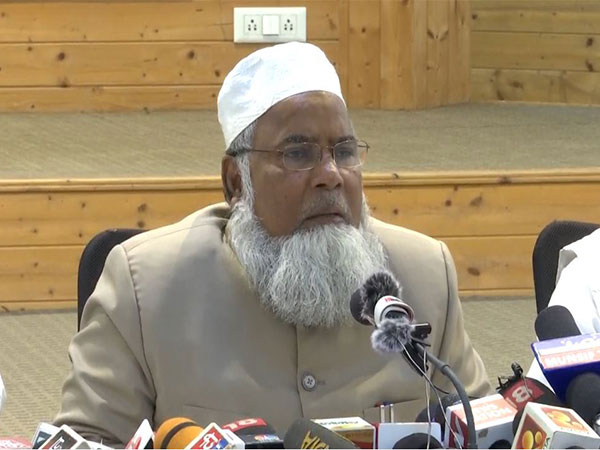New Delhi [India]: Following the permission granted for ‘puja’ at one of the ‘Tehkhana’ in the Gyanvapi mosque after the Varanasi district court order, the Muslim panel expressed concern over the same, stating that the swift permission of this action, despite the court granting a seven-day window for the administration to make necessary arrangements, raises questions about apparent collusion between the administration and the plaintiff.
On January 31, the Varanasi district court allowed the Hindu side to offer prayers in the southern ‘Tehkhana’ of Gyanvapi mosque. The court directed the Varanasi district magistrate to make arrangements within seven days for ‘puja’ to be performed by the Hindu side and a pujari (priest) nominated by Shri Kashi Vishwanath Temple Trust.
After the order of the court, “puja” and “aarti” were performed in the early hours on Thursday.
“We express our deep regret and concern over the sudden offering of prayers in ‘Tehkhana’ of the Gayanvapi mosque, marked by the overnight breaking of iron grills and placement of idols,” said Maulana Khalid Saifullah Rahmani, President, All India Muslim Personal Law Board (AIMPLB), while addressing the media here in the national capital.
“The swift initiation of this action, despite the court granting a seven-day window for the administration to make necessary arrangements, raises questions about apparent collusion between the administration and the plaintiff, attempting to foreclose any effort by the Mosque Managing Committee to pursue remedies against the District Court order. We express deep surprise and disappointment at the judgment rendered by the Varanasi District Judge. In our perspective, this decision seems to rely on a highly incorrect and unfounded argument, asserting that the family of Somnath Vyas used to worship in the basement of the Gyanvapi Masjid until 1993, and it was closed on state government’s orders,” he added.
The AIMPLB president further said, “Moreover, on January 24, the same court handed over the custody of the basement to the district administration. It is imperative to clarify that no puja was ever conducted in this ‘Tehkhana’.
The District Judge’s decision, based on an absurd and baseless claim, is highly questionable, especially given its timing on the last day of his service. Equally concerning is the unilateral disclosure of the archaeological survey report by the Hindu side to the press, causing turmoil in society.”
He further alleged that the report of the Archaeological Survey of India (ASI), which suggested that the mosque was constructed during Aurangzeb’s rule over the remains of a Hindu temple, is merely a ‘claim’.
“Importantly, this report is currently merely a claim, as it has not been discussed or confirmed in court. Apart from this, the expeditious execution of the district court’s order by the administration was evidently aimed at undermining the right of the mosque party to seek immediate relief from the High Court. Likewise, we believe that the district court should have afforded the mosque party an opportunity to appeal, as it is its legal right,” said Rahmani.
“The issue extends beyond the Gyanvapi Masjid; baseless claims are persistently made on places of worship like the Shahi Eidgah of Mathura and the Sunheri Masjid in Delhi, along with numerous mosques and waqf properties across the country. This trend of unwarranted claims at various places of worship raises serious concerns. The continued silence on the Place of Worship Act of 1991 by the Supreme Court has become a source of deep worry for the Muslim community in the country,” he added.
The AIMPLB president further said, “In a democratic system, the courts serve as the last resort for justice. The recent comments of Hon’ble Supreme Court Senior Advocate Dushyant Dave about the judiciary becoming a “majoritarian judiciary” and that the judiciary is remaining silent while several transgressions of law are taking place at the instance of the Executive” are deeply concerning. If the courts appear biased, it raises fundamental questions about where justice can be found.”
“The profound commentary from a senior lawyer on the judicial system of the country signals a potentially disastrous future. Numerous court decisions seem to align with the sentiments expressed by this distinguished lawyer, reflecting the concerns of minorities and oppressed classes in the country. This matter goes beyond preserving the dignity of the courts; it is also about safeguarding minority communities and marginalised sections from feeling deprived and frustrated,” he added.
Rahmani further said that the Muslim panel would approach the President regarding the matter.
“We believe that this time, the dignity of the country and the impartiality of the judicial system and administrative affairs have been grossly compromised. It is the prime responsibility of all constitutional officials to take timely notice of it. In this critical hour, as representatives of Indian Muslims, we have requested time to communicate these concerns to the President of India, who holds the highest office in the country,” he said.
“We hope that, at her level, she can take steps to address these issues. Additionally, we intend to convey the sentiments of the Muslim community to the Chief Justice of India in a respectful and appropriate manner. We hope that they can use their influence to address this situation and protect the principles of justice and equality that underpin our democratic nation,” added the AIMPLB president.
Meanwhile, the Masjid Intezamia Committee of Gyanvapi mosque in Varanasi filed a revision petition in Allahabad High Court on Thursday against the Varanasi District Court’s order allowing Hindus to perform prayers inside the southern celler of Gyanvapi mosque.
However, the same was declined by the High Court earlier today.

